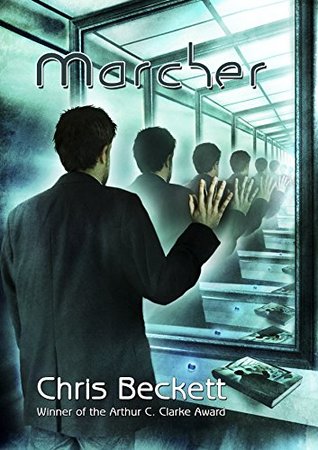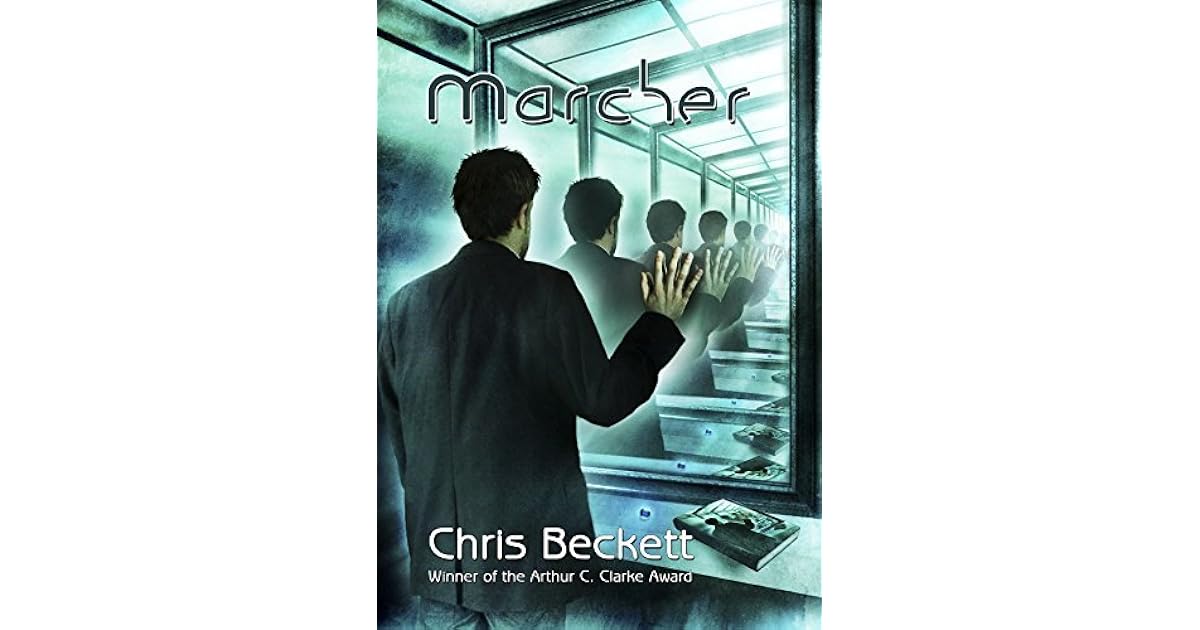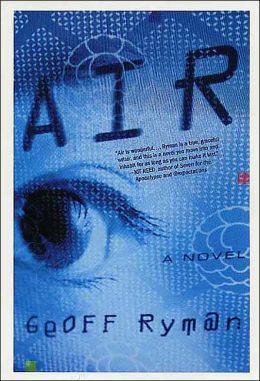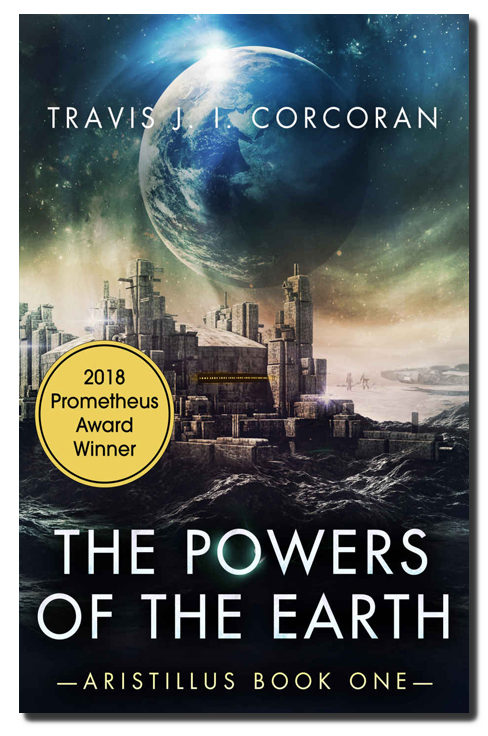Tony Ballantyne. A New Beginning.
I had to apologise as soon as I got back to the flat.
“I want to say I’m sorry.” I said, taking off my coat.
Julia looked up from her book with a drained expression and shook her head.
“Not now James. I’m too tired.” We had argued too often recently: both of us were experienced at the tactic of offering a token retreat in the expectation of a similar concession from the other side. That was when she realised. A smile spread across her face and she jumped to her feet.
“You’ve got it, haven’t you? You’ve caught Blue Glass.”
She put her arms around me and squeezed, and my body crackled and shivered. It felt nice, but the sensation quickly became too intense and I gasped. She let go of me, her face full of concern.
“Oh, I’m sorry. I forgot how sensitive you are at first. Come here and sit down.”
She took my hand in a warm and crackling grip and led me to the stained old sofa. She drained the lemonade from her glass and held it before me. In my altered vision it seemed to shine from within with a deep violet light. The moistness in Julia’s beautiful brown eyes emitted the same glow.
“Now, just use your forefinger. Rub it gently down the side of the glass.”
She licked her lips and I saw the same beautiful blue there in her mouth. I leant forward to kiss her, but she shook her head.
“No. Try the glass first. Take your time.”
I reached out with one finger and touched the glass. The potential for a note lay within. Flick it, and you would hear it. As I touched the glass that hidden note filled my body. I dragged my finger down the glass and my whole body vibrated in sympathy.
“Nice, isn’t it?” said Julia
“Mmmm.” I replied.
“Stroke the glass for the moment. Then we’ll hold a piece of wood. It has such a warm living feeling.”
We sat in silence together for some time, me stroking the glass, Julia watching me and smiling. It was as if the arguments of the last few weeks had never taken place.
“Where did you catch it?” she asked.
I gave a little shiver as the memory pushed its way through the shimmering crackle of sensation. A picture of a tall matchstick figure covered in pale white bristles leaning over me. A blank mask of a face with two dark hemispherical infrared sensing pits where the eyes should be. I stopped rubbing the glass for a moment.
“The alien infected me. I was waiting at the traffic lights by the town hall and it came running towards me. It was dodging through the cars and lorries; they were missing it with nothing to spare. I was frozen with… awe… I suppose. It stood in the road, just beyond the kerb, staring at me. You could see the shock on the drivers faces as they swerved around it.”
Julia nodded wisely.
“The town hall marks the edge of its territory. It wouldn’t cross onto the Downey Road alien’s turf.”
I nodded impatiently. This was my story.
“Yes, I know. Anyway, it stared at me for about ten seconds, and then it just flicked its head around the other way like a bird, and focussed on something up the street. Then it was off, running back into the traffic. I didn’t realise it had infected me until I was halfway home.”
I shivered at the memory. The word ‘alien’ has become a cliché. The label lets us avoid having to appreciate just how literally otherworldly the creatures are. Julia didn’t say anything, and I didn’t recognise at the time that her silence implied a deeper understanding of the situation. I began to rub the glass again, this time cupping it in both hands. The feeling was electric. I watched as wobbling cylinders of blue light rose shivering up to the ceiling and spoke in a relaxed murmur.
“This is wonderful. All this time and I never understood what you were talking about. I shouldn’t have shouted at you for getting yourself infected. I should have tried to understand when you gave up your job. We could have taken the time to share this together.”
She gave a little smile.
“There are plenty of diseases left to catch. Barnaby says there are over one hundred and fifty. I’m sure we can share some of them.”
She ran her hand through my hair and I felt it crackle as if it was filled with electricity. Warm shocks ran in delicious shivers through my body.
“That feels so good. What is causing it?”
She began to knead my head gently and started to recite a lesson that Barnaby had taught her.
“The agent that causes Blue Glass is carried in water. The aliens exude infected moisture that is caught in the layer of bristles that covers their body, ready to be brushed against someone. When you are infected the agent makes its way to your nervous system to incubate. The altered sensations you feel are the agents restructuring your nervous system so that they can reproduce. When reproduction starts the sensations will pass, but your body will be capable of receiving more of the alien diseases. Blue Glass is paving the way.”
“Oh.” I sighed with pleasure. “How long will this last?”
“Two to three days. Enjoy it whilst you can.”
----
When I think back to the rows we had had when Julia had first started to collect alien diseases, at the way I had called her intelligence and common sense into question, I was always a little surprised how calmly she accepted my apologies. The first few days after I caught Blue Glass were almost as it had been at the start of our relationship. Almost. There was always that little pool of silence between us. That thing we would not talk about.
Straight after Blue Glass I caught Sunshine in my Bones. Sunshine in my Bones. It’s an odd name to those who’ve never had it. Do you know what it’s like to have a bad cold, and to lie wrapped up warm in bed? That feeling of contentment as someone brings you hot drinks and you don’t have to worry about work or responsibility or anything but just snuggling up and getting better? That’s what Sunshine in my Bones is like, and without any of the bad parts like the blocked ears or headaches or runny nose.
I remember smiling up at Julia from the sofa as she brought me another cup of hot lemon tea.
“Why is the alien doing this to us?” I said.
She brushed a magazine onto the floor and perched on the edge of the sofa and gave me a smile.
“I don’t know. Barnaby says that the alien is altering our bodies. Each disease improves us a little bit. First your nervous system, now your bone marrow is being rejuvenated. Each disease makes us a little bit better.”
I frowned and sipped the tea. It tasted so good I felt bad about disagreeing with her.
“Oh. It’s odd. I get the impression the aliens don’t care about humans one way or another. Look at our alien. Sometimes it’s creeping down the high street on all fours, feeling the paving stones, other times you see it perching on the roof of the King’s Arms, staring at the stars. I keep seeing it climbing in and out of the manholes. It runs around the bounds of its territory, or down the middle of the high street, dodging people as if they weren’t there, but it never seems to take an interest in us. When it infected me it was like it was looking right through me.”
Julia leant back on the chair and stretched luxuriously. She was growing her hair out. Peroxide strands bunched up on the sofa cushions, their glossy brown roots making a cushion for her head. She gave me a patronising smile.
“You’re trying to read your own body language conventions into an alien being. The Betas have been travelling through the galaxy for millennia. Barnaby says they share a common pool of race memory that they use to communicate with each other. Does body language mean anything to a telepath? Do you really think we can hope to relate all our experiences to such an advanced race?”
I felt a little hurt. My reply was petulant.
“They don’t seem that advanced. They seem more like a flock of birds that have descended upon our planet. Like a bunch of robins, each defending their own territory. They never seem to communicate with us humans.”
“Mmm. Maybe not yet.” replied Julia enigmatically. She suddenly yawned and stretched and then stood up.
“I’ve heard that Selina has caught something called String Symphony. It sounds interesting. I thought I might call round her flat and see what it’s like. Do you want to come?”
I shook my head. I was quite happy with Sunshine in my Bones for the moment.
“Suit yourself.” She said, walking from the room. “I’ll see you later.”
“Bye.” I said, but it wasn’t the same after she had gone. I fell asleep trying to imagine my body being converted by diseases, transforming me into some wondrous new being. Instead I had nightmares. An alien stared at me with its unseeing dark pits of eyes. It sighed with pleasure as my will was slowly stripped away by wave after wave of disease until I was left completely under its control.
When I awoke the Sunshine was fading from my bones.
----
Julia caught String Symphony off Selina and walked around for a week with a smile on her face, the music of the spheres ringing in her ears. No matter how hard I tried, I couldn’t get that disease to take hold. Me, I caught Scabs instead. My skin swelled up in large red weeping pustules that quickly hardened over to form brown scabs the size, shape and colour of pennies.
“This is awful.” I moaned, sweeping dead scabs from the bed one morning.
“You’re telling me.” said Julia distastefully. “Can’t you sleep on the sofa?”
I stared at her in surprise.
“You could show a little more sympathy.”
“Like you did to me when I had Scabs?”
I dropped my eyes.
“Sorry. I didn’t realise what it was like back then. I thought it was your own fault.”
She came close and brushed her lips across my cheek.
“I know. Most uninfected people still think that way. Poor baby.”
I sat on the edge of the sagging bed and wriggled my toes in the reddish pile of the old carpet. I rested my handful of rusty brown scabs on my knee and looked around the tired yellow wood chipped walls of the room. The novelty of sharing a flat together had worn off, now I stared at the grey woolly strand of cobweb that trailed from the ceiling to the shapeless brown wardrobe and wished I could go out for the day. Anything to get away from the warm claustrophobia of our dimly lit rooms and the endless cups of milky tea I needed to drink to feed my pus filled scabs.
“I hate this.” I said, sighing. “I can feel myself draining away. Every scab that drops off is like another part of me gone for good. Do you think that’s what the alien is doing? Harvesting us bit by bit? Salvaging our genetic material from the biological detritus our bodies slough away? If we keep this up long enough there will be none of me left. The alien could be rebuilding me as its slave on its spaceship.”
“The alien doesn’t have a spaceship. Everyone knows that.”
“Well. You know what I mean. Think about it. Every disease we catch alters us in some way. Why come all this way just to infect us with them? There’s got to be reason for it. What are they turning us into?”
Julia picked up her hairbrush and knelt down in front of the half-length mirror that lay propped against the wall by the door. She began to brush her hair slowly, pulling out the strands so she could see the natural colour shining in the light. I thought about how I preferred her hair short and blonde, but I said nothing. She continued to brush in silence. I began to speak again.
“I mean, look at me. Over the last few weeks I’ve had my nervous system changed, my bone marrow altered and now I’m shedding my skin. I heard that the change was genetic, it’s being wired into our DNA. Our children will be born already transformed. It’s not like they’ll have a natural resistance to Blue Glass, its just that they will already by altered by it so that it won’t be able to affect them. I mean, you can’t tell me that doesn’t worry you. How do we know the aliens are acting in our interest?”
Julia pulled the brush angrily through her hair and then dropped it on the floor. She spun to face me.
“You really annoy me sometimes, James. You don’t listen to a word I say, you disagree with everything you read, and yet you’re willing to believe anything you’re told by some bloke down the pub. The aliens cannot and will not harm humans. This is an accepted fact. It was established at contact. No one, absolutely no-one disagrees with that. No-one but you.”
I shook my head slowly. Actually, I didn’t believe any differently, either. No one who felt the wave of belief that washed across the world that night when the aliens finally struggled free of that gigantic mud heap they had been growing on Wanstead Flats could ever feel otherwise. Hello, it had said. We heard your minds calling across space. We will not harm you. It was so obvious it was almost without question.
Those who may think us credulous and foolish for believing, I say this: firstly, unless you were there you cannot understand, and secondly, events have since proved us right. The Aliens never intended to harm us.
Julia’s face softened.
“I’m sorry for being so snappy.” she said. “It’s not your fault. I remember what it was like having Scabs. You feel negative about everything. Don’t worry. You’ll get over it.”
She straightened up and ran her fingers through her hair, looked at herself in a approval and then reached for her new brown woollen coat, hanging on the back of the door.
“I’m going out for a while.” she said. “I need some fresh air. Do you want anything?”
I looked down at the carpet and sighed.
“Stay with me.” I said. “I’m bored.”
“I’ll only be an hour or so.” she said. “Are you sure you don’t want anything?”
I looked down at the cluster of scabs in my hand and sighed again.
“Nothing really. What should I do with these?”
She followed my gaze and began to giggle.
“You should collect them up and keep them nice and safe in a jar. Stop the alien stealing them.”
I smiled and shook my head in pretend despair.
“You’re sick.” I scraped the remaining few scabs from the bed into my hand and carried them into the bathroom where I threw them into the toilet
----
We both caught Forget-Me-Not from a couple in a pub that stood near the town hall. They had caught Blue Glass almost as soon as the alien had staked out its territory around South Street and were old hands at the disease game by now. They were very dismissive of Julia’s attempts to impress them with her recent bout String Symphony, but they laughed when I told them of my jar full of Scabs. As the evening wore on and we got drunker together they agreed to infect us. Forget-Me-Not is a nodal disease, like Blue Glass. You need to catch it to open up the possibility of catching others. Round about closing time the male half of the couple leant across and kissed me full on the lips, then began to giggle. I smiled and forced a laugh, not realising what the joke was. I never knew until later that the vector for Forget-Me-Not was a state of mind, not physical contact. Getting drunk helps the disease to jump across to that bit at the base of the brain already subtly changed by Blue Glass.
Julia and I staggered home, arm in arm.
“I’m drunk.” She giggled. “I can’t remember where we live.”
“This way.” I said, pointing down an alley. A metal fence, half way down its length, blocked it. Beyond lay the dark emptiness of a wasteground. We both started to laugh.
“Forget-Me-Not is reprogramming our brains.” said Julia. “It’s shifting our memories around, storing them in other places.”
I stood swaying, trying to remember. All I could think of was Christmas cake. Sticking a skewer into it to make holes then pouring whisky over it from the cap of the bottle. The taste of the rich, alcohol soaked sultanas filled my mouth. The sensation suddenly vanished and I had a flash of memory.
“We’ve come the wrong way. Back down the road.”
----
Forget-Me-Not is the best disease. You might not think so, but when you’ve been there…
Julia and I sat up in bed playing remember games.
“I remember the first time I saw snow.” she said. “My Daddy held my in his arms and I looked up into the dark sky and these big white flakes came drifting down towards me. I was screaming with delight. And then a flake fell on my tongue and I just giggled and giggled.”
I held her hand and tried to remember her name. It came back to me in a sudden rush along with a burst of real affection. It was like that rush from the first three weeks when we first started seeing each together. Something else went from my mind.
“I’ve forgotten what the Beatles sounded like.” I said.
“Whoah! Good one.” said Julia, impressed. The memories would come flooding back, you see, and it would be like hearing each song again for the first time, only this time you had everything else wrapped around them, all the deeper understanding you later picked up that let you really appreciate what you had got.
After all is said and done about what the aliens did to us, Forget-Me-Not was still a wonderful thing.
Julia began to smile. She squeezed my hand tight and curled up her toes to make bunches of the cheap patterned bed sheet.
“I’m going to sneak out later on and see Barnaby. We’re sleeping together, you know.”
She giggled.
“Oh no. I forgot. I’m not supposed to say that, am I?”
I ran my hand through her lengthening brown hair and played with the blonde streaks at the end. I was giggling too.
“Don’t worry. My brain is telling me it knew already.” I laughed louder. “Ooops! I’ve forgotten it now!”
But it would come back later and then it would really hurt.
“Forgotten what?” said Julia, and we both laughed louder.
The moment passed, we sighed and then lay back in silence. Julia rolled onto her front, rested her head on my chest and began to stroke my arm.
“This is it then.” she said. “Final understanding. They say that Forget-Me-Not is the end of the beginning. We shall achieve a state of grace that leads us to appreciate the remaining diseases we shall catch. Our bodies are prepared.”
“Mmmm” I said. I gazed at the big fragile ball of the paper lampshade.
“All those years, all that distance. Soon we will be able to tap into the aliens’ pool of race memories. What must it be like, to look across space and see other creatures’ minds, shining in the darkness like the stars?”
“Enlightenment.” I said.
“I think so.” said Julia, dreamily. She tensed suddenly.
“Hold on. It’s coming. Can you feel it?”
I could. A huge dark pit opening up somewhere, and we were falling towards it in our minds. There was a light at the centre. Julia gripped my arm, and I folded myself around her. The light expanded and washed over us.
----
Julia left me the following week and moved in with Barnaby. They’ve both got a nice flat in the seedy area just behind the town hall. It looks a lot more rundown than it is, due to the local kids graffittiing up the walls, but Julia swears she feels safe if she has to go out at night. Funnily enough, it’s just around the corner from the wasteground that we ended up at that night we forgot the way home. Julia has some theory that we can read our own thoughts forward in time as well as back and she was heading to her future house. I say it was just coincidence. We argue about it when we meet to swap diseases. There is a sizeable minority of the enlightened who think that she has a point, but by and large most of us think it is just fantasy. Its rare that you meet an enlightened one who doesn’t have both feet planted firmly on the ground. We’re a sensible bunch. Well, you have to be, don’t you? You build up all these fantasies about your place in the universe, about how someone is watching over you and then the aliens appear and its like you can just give up. Here they are to help you transcend your body and make the conversion to a higher plain of existence, but of course its not like that, is it?
A bunch of farmers: that’s what they are. Actually, they’re not so much farmers as herders. Slowly traversing the universe through the millennia, looking for planets where life has evolved that will support their livestock: the hundred and fifty or so diseases that make up their herd. They rear them inside the bodies that are their new pastures, and reap their bizarre harvest by collecting the dead bacteria that we excrete. Julia and I saw all that in one huge loop through their accumulated race memories, just after the Forget-Me-Not put us in contact with the shared part of their consciousness. Swooping back through time, world upon world, to some insignificant planet far away where they first evolved. Bouncing forward again, following them as they moved on to new worlds when a planet’s inhabitants and their future offspring had grown immune. When the metaphorical soil can be farmed no more.
It’s a sobering thought, and one that forces you to face up to the facts. They weren’t interested in us at all. We knew it in our heart of hearts, you only had to see the way they looked at us.
Seeing the truth like that forces you to come to grips with the real world.
So what have I done? Well, I’ve cleaned up the flat. That long cobweb had to go. I’ve thrown out the old clothes that have been cluttering up the wardrobe and sold the guitar I never learned to play. I’ve even cleaned out the fridge. I’ve dusted off the word processor and started writing articles for magazines and newspapers again. This article has been my first attempt, shaking the dust off, as it were. I feel as if I’m back in control of my own life rather than just waiting for things to happen. I guess we all put our lives on hold when the aliens arrived.
Oh, and I’ve got a bit of a sore throat, like I’m coming down with something. I hope it’s just a cold.






